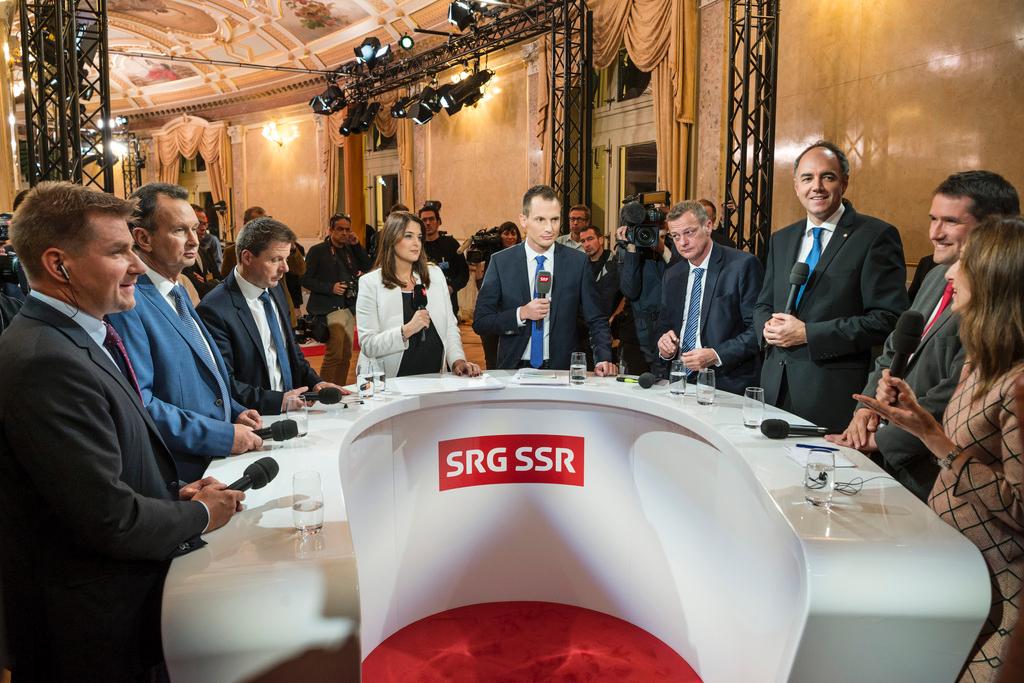Final composition of Swiss parliament emerges

After the final Senate election results in cantons Aargau and Zurich this weekend, the definitive redistribution of seats in the Swiss parliament is clear. The shift to the right is less pronounced in the Senate than in the House of Representatives.
On Sunday, Ruedi Noser (Zurich) and Philipp Müller (Aargau), both from the centre-right Radical Party, were elected to the Senate in the two final votes for the 2015 parliamentary election.
The Radicals now join the centre-right Christian Democratic Party as the biggest party in the Senate in Bern, each with 13 senators. They are followed by the leftwing Social Democratic Party (12). The conservative right Swiss People’s Party, a victim of the majority voting system, remains with five seats.
This contrasts with the House of Representatives, where parliamentarians are elected under a system of proportional representation. There the People’s Party made large gains in the October parliamentary elections, increasing its share of the vote from 26.6% to 29.4%, winning an additional 11 seats.
The Radicals gained 1.3% to reach 16.4% of the vote. The Social Democrats hung on to remain Switzerland’s second-biggest party with 18.8%, up 0.1% on 2011, but with three fewer seats.
The results show the combined forces on the right, winning a slim majority of 101 seats in the House. The main losers were the Greens and small centrist parties.
Senat
Despite the slight shift to the right, most experts do not expect a major reversal under Switzerland’s traditionally stable political system where no single party has a majority and changing alliances have been standard practice for decades.
But Georg Lutz, a political scientist at Lausanne University, felt the difference between the two chambers could have an impact.
“This imbalance of forces between the two chambers risks strengthening conflicts between them,” he told Swiss public radio, RTS, on Sunday.
Daniel Bochsler, a political scientist at the University of Zurich and the Centre for Democracy in Aarau, said the trend of the past 20 years was continuing.
“Namely, the People’s Party is strong when it comes to mobilising voters who are conservative, nationalist and in favour of a closed Switzerland. However, this means the party is isolated and unable to form majorities and therefore it struggles in a majority system,” he told swissinfo.ch.
For Bochsler, the real Senate winners of the 2015 elections were the Social Democrats, whose 12 seats are the most it has ever had.
“Even in cantons where they are in a minority, they manage to get their representatives elected.”
In Aargau, for example, where the Social Democrats have around 20% of the vote and the People’s Party almost 40%, Pascale Bruderer was elected for the Social Democrats in the first round of voting. She managed to attract votes from non-Social Democrat voters – something the People’s Party struggles to do.
Swiss parliament
The Swiss parliament is made up of the 200-seat House of Representatives and the 46-seat Senate. The House represents the population; the Senate represents the cantons.
As a rule, the house is elected under a system of proportional representation, taking into account the number of Swiss residents in each of the 26 cantons of the country. In the elections for the Senate, traditionally representing the interest of the cantons, different rules apply under the ‘first-past-the-post’ system.
The registered Swiss abroad have the right to vote, but there is no separate constituency. Elections to the House of Representatives take place every four years in October.

In compliance with the JTI standards
More: SWI swissinfo.ch certified by the Journalism Trust Initiative











You can find an overview of ongoing debates with our journalists here . Please join us!
If you want to start a conversation about a topic raised in this article or want to report factual errors, email us at english@swissinfo.ch.